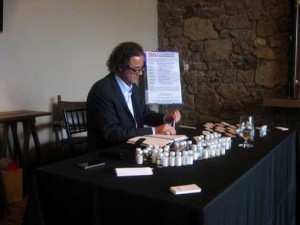I walk into an event room at Niner Wine Estates in Paso Robles, Ca, for a class in wine aromas expecting to see lots of wine bottles and glasses. No such luck. The only bottles are small vials set out on one table. I’m thinking, ok this will be interesting.
The man seated at that table is Alexandre Schmitt. He’s not a winemaker or an enologist. Instead, Alexandre is a perfumer. He calls himself a Creator of Perfumes and an Expert of Wine Aromas. His goal is to help people working in the wine industry find a common language to express what they smell when they stick their nose in a glass. All the vials that he brought are full of essential oils and flavored oils.
“I use objective aromas that can be perceived,” he says. “It’s not a critical review in the journalistic approach where you have lyrical prose, which is subjective and not objective.”
Over the past several years Alexandre’s been traveling in the US to give workshops in Napa Valley, Paso Robles, the Central Valley and Washington’s Walla Walla wine country. As demand for his services grows, he finds himself spending more and more time here. I’m meeting him at the end of week one out of six weeks.
Alexandre’s path to becoming an expert of wine aromas started when he turned 15 years old. Born in Bordeaux, France, he chose to study science, not wine, but he wanted a creative way to learn. He applied and got into the prestigious Institut Supérieur International du Parfum (ISIP) in Versailles.
“It was the only thing that I could see for myself when I was studying and so i developed my sense of smell by myself quite young by paying attention being very curious around me.”
Post-school Alexandre went to work for a large fragrance company in Paris. I ask him what perfumes he created. He says found himself developing fragrances for less glamorous products such as shampoo and cleaning supplies. He hated it. “After a few years of being a creator of perfumes in Paris I didn’t like the job as much. It’s a very technical job, you are in a lab like a chemist and it’s not fun. In the fragrance industry perfume 5% of their business is to create perfume and 95% of it is making scents for toiletries, shampoo, cosmetics and lipsticks.”
Frustrated by not being as creative as he’d like, he returned to Bordeaux, not to work in the wine industry, but to write books. Then the wine industry came calling. “They asked me if we could do some work together because for doing your job as a creator of perfume you have to memorize a lot of smells, up to 1,500, when a winemaker has at the most 50 smells that they learn.
One of the winemakers calling was from Petrus, one of the most famous and highly regarded wineries in the Pomerol district of Bordeaux. “He said to me ‘I will teach you what I know and you will teach me what you know, but that’s the deal. I don’t pay you, you will go back to your home with some bottles to taste when you are working at home’ and so we did it like that.”
Wow. Not a bad place to learn about wine.
That was some 20 years ago. Now Alexandre consults for clients around the globe, helping winemakers with blending wine. “I tell them ‘I am not a winemaker I don’t plan to interfere with their work.’ We have some lots of wine, I evaluate them by smell and texture, and I immediately mix that like I was mixing for perfume.”
While his nose is usually behind the label, a Spanish winery thinks so much of Alexandre’s blending work that they put his name on their label. The wine is the Ysios 2007 Esencia de Ysios made with Tempranillo the Rioja region of Spain.
I ask Alexandre if he finds wine to be like a perfume. He says there are differences, like the grade of alcohol, which we know as ethanol. “In perfume you have 95% alcohol of when you have only 12 14 16 18 percent in the wine. It’s easier to smell aromas in perfumes than in wine. Trying to identify individual aromas in wine is like trying to isolate a single instrument in an orchestra.”
Alexandre says that there are also similarities in wine and perfume. “They evolve over time. The wine evolves in the glass and the perfume evolves on your skin.”
Now getting back to those vials of liquid at Niner. Alexandre’s been at the winery all week leading olfactory workshops with winemakers. Today his class is open to the public, and 27 of us signed up, eager to learn from this aroma expert.
Alexandre dips a handful of blotter strips into a vial and passes them out. He asks us to write down all the scents we smell. Then we go around the room, and everyone names what they smell. I get cedar. Some people get pencil shavings. Turns out this is cedar, which he classifies as a woody aroma. He divides scent into these categories:woody, resin, balsamic, floral and citrus. It’s a language he’s teaching to help people have a common way to describe the aromas in wine.
We sniff our way through 14 aromas, everything from juniper to bergamot and mint. Alexandre tells us this is a starting point. He hopes he has opened a world of fragrance for us and that we will now be more aware of aromas that we encounter every day, and can express what we smell in a common language.
By the way, Niner Wine Estates makes a Grenache Blanc, a wonderfully aromatic white wine that’s sold only in their tasting room. If you visit Niner, an absolutely beautiful winery, do not miss this wine.

